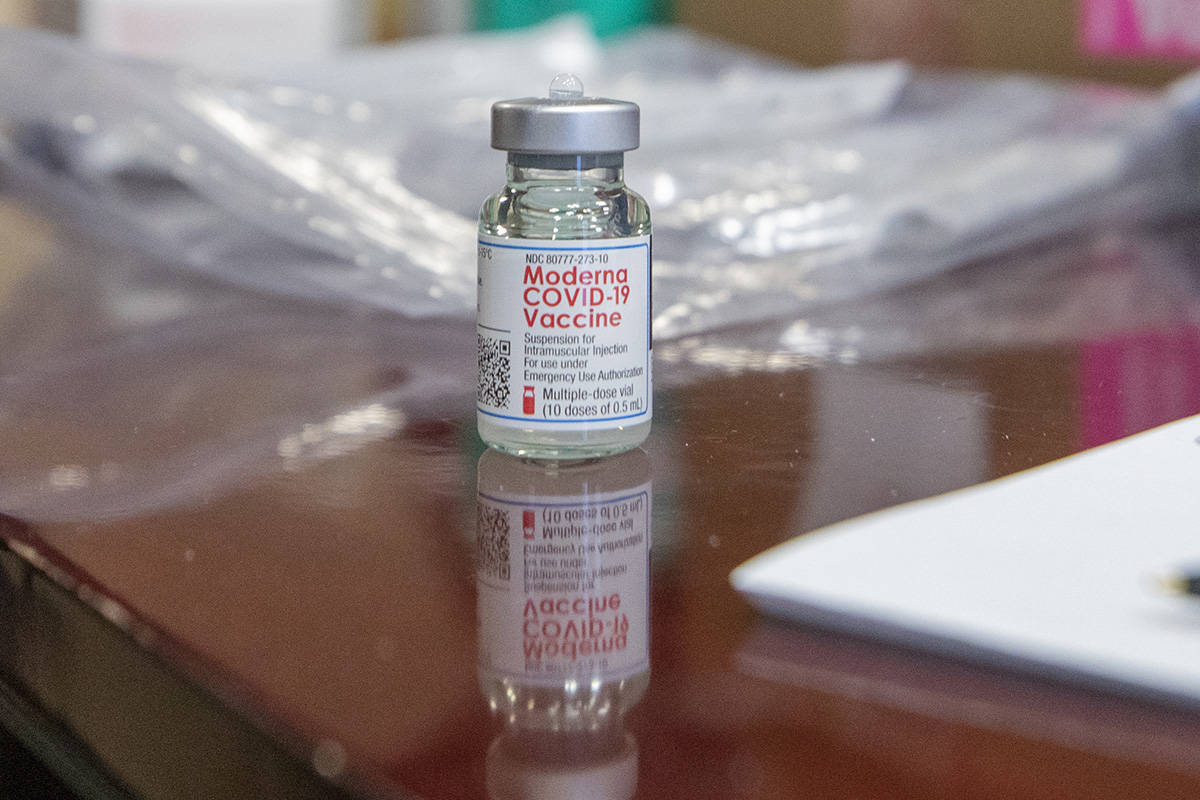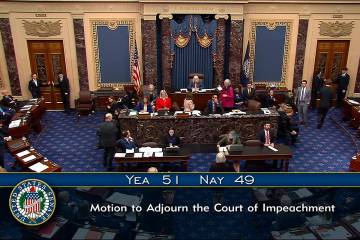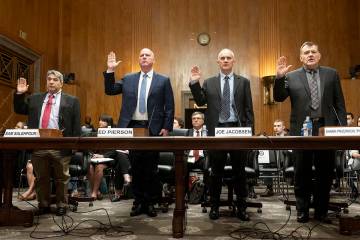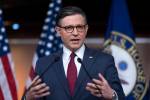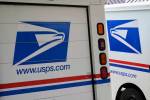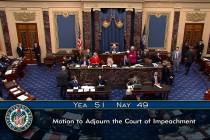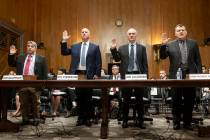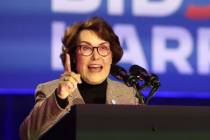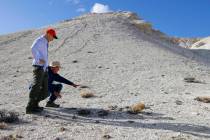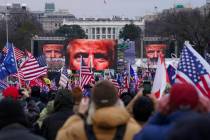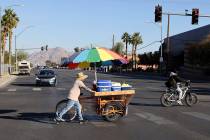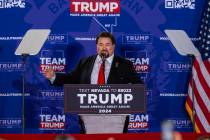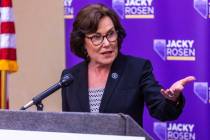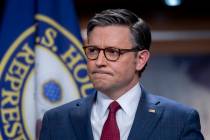Nevada lawmakers working to get more COVID vaccine
WASHINGTON — Wide-spread logistical problems hindering the rollout of coronavirus vaccines in numerous states have spurred the Nevada congressional delegation to pressure the Biden administration to streamline the process and deliver adequate doses to the Silver State.
“If it doesn’t get fixed, it’s going to get worse,” said Rep. Mark Amodei, R-Nev., who blamed a cumbersome bureaucratic process for creating a delay in delivery of vaccines to inoculate people from the COVID-19 virus in Nevada.
“Clearly, there are some things that need to be streamlined,” Amodei told the Review-Journal.
Nevada Gov. Steve Sisolak, a Democrat, and other governors, including Republican Larry Hogan of Maryland, have called on federal officials at the Centers for Disease Control and Prevention to explain shortages to the states and clarify distribution methods of vaccines.
Nevada ranks as one of the lowest in allocation of vaccines. That prompted Sisolak to go public with his complaints this week.
Sen. Catherine Cortez Masto, D-Nev., and Rep. Dina Titus, D-Nev., have called the White House and Biden administration officials seeking immediate remedies to the supply shortage.
The CDC ranked Nevada and South Carolina as the two worst states for administering doses, or “shots in arms,” following distribution. But roughly 18 states were ranked low on administering doses.
Nevada lawmakers dispute the ranking, blaming a lag in reporting for Nevada’s low ranking, which is actually several percentage points above the CDC median ranking for states. And Nevada claims they have been allocated doses for 9,316 for 100,000 people, compared to 10,000 per 100,000 delivered to other states.
Demanding answers
Lawmakers said they want to know how the federal government came up with such a low allocation.
Cortez Masto said she is trying to set up a meeting between federal officials and the state to address those concerns. “High demand for the vaccine and little federal guidance by the previous administration have strained systems across the country,” she said in a statement.
The Trump administration distribution system was “a dismal failure,” said Titus, “and Nevadans are suffering the consequences.”
Titus, one of the first congressional supporters of Biden’s presidential campaign, said she is talking with administration officials to ramp up distribution.
“I will work directly with the new team to ensure Nevada gets its fair share of doses,” Titus said.
In addition, she disputed the CDC ranking of Nevada for administering doses at less than 55 percent, noting that information submitted by the state to the federal government shows 60 percent of the virus drugs were administered, higher than the national average for states.
Nationally, news reports about states lagging in their vaccine distribution and concern that the supply of vaccines will not meet demand found 65 percent of adults saying the federal government is doing a fair to poor jobs delivering doses to the states, according to a Kaiser Family Foundation poll conducted Jan. 11-18.
Nearly the same number of adults, 61 percent, say the states are doing a fair to poor job distributing distributing vaccines to people in their states, according to the poll for the Kaiser Family Foundation, a health care think tank.
The poll of 1,563 adults has a margin of error of plus or minus 3.5 percentage points.
Problem needs solving
“I know there’s an addiction that everything’s political these days but this is just a problem that needs solving,” Amodei said. “We don’t need to blame Joe Biden or Donald Trump, or you know, the governor of whatever state depending on what your politics are,” Amodei said.
He said there were no surplus doses sitting on a shelf in Nevada. Doses unused remain accounted for by people who received a first vaccination and will need a second.
Amodei said manufacturers, Pfizer and Moderna, were producing a sufficient number of vaccines to meet goals, with another being developed by Johnson and Johnson likely to be available soon.
Walgreens, Smith’s groceries and pharmacies, health care providers and clinics and the Department of Veterans Affairs are distributing the vaccines throughout Nevada, although the Veterans Administration has its own protocols and network.
Amodei laid the blame on the bureaucratic web that requires those administering the vaccines in rural and urban areas to calculate how much vaccine will be needed, submit it to the state, which then submits it to the federal government, where CDC and officials weigh the request and send a number of doses that may or may not meet demand.
“That’s what the holdup is,” Amodei said, “How much Walgreens on Flamingo gives each week” and then forecasting how many more doses will be needed as additional people become available to the vaccine, placing some on waiting lists and dealing with people who get on several lists to get a dose.
The congressman said the roughly 10-day process of requesting vaccines and then having it shipped is “a helluva lot of steps over several days.”
“It’s definitely bureaucratic,” Amodei said.
Amodei noted that he is working with Cortez Masto, calling on Washington to get answers for supply and delivery questions dogging many states.
Working to get more
Sen. Jacky Rosen, D-Nev., said she is “working with the governor’s office to find ways to increase access to vaccines at the federal level.”
Rosen is a member of the Health Education Labor and Pensions Committee. She signed onto a recent letter to the Trump administration urging it to actively engage with states’ vaccine distribution efforts.
The coronavirus relief package passed by Congress in December included $9 billion for the CDC and the states for vaccine distribution. Of that, Nevada is to receive $47 million, Rosen said.
Governors have complained that vaccines once expected during the Trump administration never materialized. Alex Azar, former health and human service secretary under Trump, blamed states for distribution and administration of doses of vaccines.
“I’m hopeful that the Biden administration will implement their distribution strategy and quickly address concerns levied by the state,” Rosen said.
Delay in new boss
The Senate committee on health is expected to soon hold a confirmation hearing on former California Attorney General Xavier Becerra, Biden’s nominee for health and human services secretary, who will help lead the distribution effort.
The Senate has been slowed by its organization and establishment of rules for a divided 50-50 Senate. Democrats have taken control of the chamber with the vice president’s tie-breaking vote.
In addition, the Senate is taking up a trial on an impeachment article against Trump over his role in inciting an insurrection at the Capitol on Jan. 6.
Biden has urged the Senate to take up his top priority, a $1.9 trillion coronavirus relief bill that would include more funding for vaccines.
Republicans have voiced concerns about the size of the coronavirus relief package price tag.
Sen. Susan Collins, R-Maine, said it was important that the Biden administration justify the cost of the legislation. She said funds from previous relief bills have yet to be spent.
Amodei said Collins raises a valid point, since the last bill was only passed and signed into law in Dec. 22.
Contact Gary Martin at gmartin@reviewjournal.com. Follow @garymartindc on Twitter.



